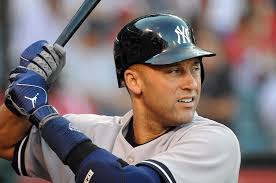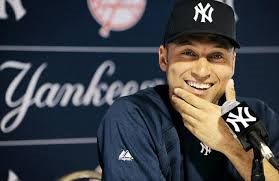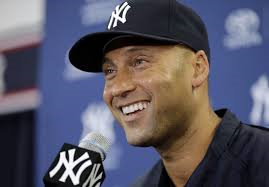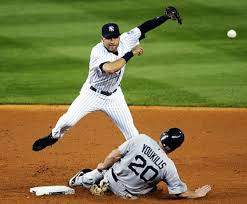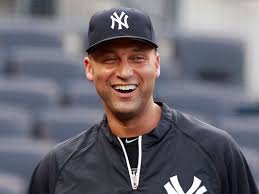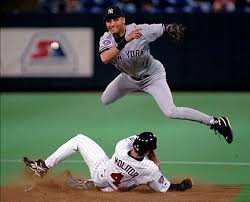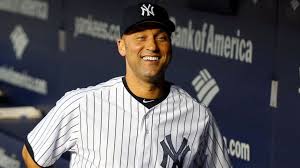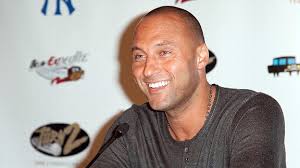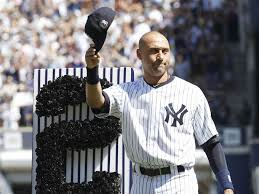Derek Sanderson Jeter played for the New York Yankees. Lots of people hate the New York Yankees. They hate the fact that Jeter gets deified and think if he played for a lesser team he would just be considered average. They say he has no pop. They say his glove is weak. They say he’s a byproduct of better players around him. They say he’s overrated. Some think Honus Wagner was better, but he played in an era in which most pitchers were throwing at speeds that wouldn’t qualify them for low-A ball today, African-Americans weren’t allowed to play, and defenses (and gloves) were terrible. Plus there were 8 teams and they carried less pitchers so he knew them all. Anyone who argues Wagner was better than Jeter lacks an understanding of the context of baseball history, and is just regurgitating numbers. Cal Ripken Jr. is a decent argument, but his lifetime batting average is 33 points lower and his career on base % is 37 points lower, he grounded into 63 more double plays and had 280 less hits despite having 283 more plate appearances. Ripken had more power, but if that’s the only argument then J.J. Hardy is better than Jeter too.
I’m not going to get into semantics, just facts and stats. Here’s why he has the clutch moniker, here’s why he’s won more than any baseball player in the modern era, and here’s why he’s the greatest shortstop to ever play the game.
He was the AL Rookie of the Year in 1996 slashing .314/.370/.430 with 10 homers, 78 RBI and 104 runs scored. But the real legend of Jeter began, of course, in October. It’s easy looking back on the juggernaut Yankee teams of the late ’90’s to assume they steamrolled everybody. They didn’t. They fought through adversity better than any team in recent memory, and they made their opponents pay for their mistakes. One misstep against the Bombers was fatal. And they seemed to play better when the money was on the line, reveling under pressure and playing their best when it mattered most, and the Captain always led the charge – the common denominator of his team’s late inning heroics.
The dynasty almost never was, or at least, almost didn’t begin in 1996 – and if the Yanks lose that World Series who knows how history plays out, maybe the Braves would have been the dynasty of the era and this article would have been written two years ago about Chipper Jones. The Yanks got demolished in the first two games of the ’96 Series against Atlanta by a combined score of 16-1. At home. It’s easy to forget it looked like curtains on Oct. 22. They got a win in Game 3 but were looking down-and-out in Game 4, losing 6-0 in the sixth against future Yankee Denny Neagle who to that point had only surrendered one hit: a fluke grounder by the opposing pitcher Kenny Rogers. Jeter leads off the inning with a base hit, followed by a Bernie Williams walk, and back-to-back run scoring singles from Cecil Fielder and Chuck Hayes. Jeter started the rally that cut the lead in half, but he wasn’t done yet. Jim Leyritz tied the game with a homer in the 8th and they went to extra innings. In the 10th, with 2 out and Tim Raines on first Jeter singles into the hole. Bernie is intentionally walked, Wade Boggs draws a pinch-hit walk, and Fred McGriff drops a pop-up off the bat of Hayes and that’s all she wrote. The Yanks won the next two games and the championship. Jeter had the only hit in the most important inning of the Series, the inning in which the advantage swung in the Yanks favor for the first time and for good.
Again, because the Yankees swept the San Diego Padres in the 1998 World Series and did the same to the Braves in 1999, it’s easy to forget Game 1 against Atlanta and how the whole Series could have been different if not for Jeter. In the 8th inning the Yanks were down 1-0 against all-time great Greg Maddux. The bases are loaded thanks to a Scott Brosius single, a Darryl Strawberry pinch-hit walk, and an error on a Chuck Knoblauch bunt attempt by reserve first-baseman Brian Hunter who had just entered the game that inning to replace starter Ryan Klesko. Jeter rips a single to left to tie the game. Maddux is then replaced by psycho-asshole John Rocker who proceeded to walk the ballpark ensuring a Yankee victory.
2000 was a season for the ages for number 2. He had a career-best .339 batting average, a .416 on base %, 15 jacks, 73 RBI, 119 runs, 22 steals, and 201 hits. Not bad especially considering he missed 15 games. He was the MVP of the All-Star Game going 3-for-3 with a double, 2 RBI, and a run scored. He was also the MVP of the World Series against the New York Mets, the one Series the Yanks absolutely had to win. Many times Jeter has alluded to the fact that had they lost that Series they would have lost the town and may have never gotten it back, plus who knows how many heads would have rolled when George Steinbrenner finally put down the axe.
Due to the fact that the Yankees beat the Mets in 5 games it’s once again easy to forget how close the Subway Series was. The final scores of the five games were 4-3, 6-5, 4-2, 3-2, and 4-2. Jeter led off Game 4 with a home run, a day after the Mets had won and cut the series to 2 games to 1 and immediately ended any momentum the cross-town rivals were hoping to build. Since the Yanks won that game by one run, his shot can be argued to be the difference. As usual, he wasn’t done getting clutch hits just yet. Down 2-1 in Game 5 Jeter tied the game in the 6th inning with another solo homer off future teammate Al Leiter. An hour later the Yanks were champions again. In the Series he hit .409 with 2 doubles, a triple, 2 home runs, 2 RBI, 6 runs scored, zero errors, and 9 hits in the five games. Unbelievable.
In 2001 Jeter had another phenomenal season. He slashed .311/.377/.480 with 21 homers, 74 RBI, 110 runs, and 27 steals. The Yankees were two outs from winning their fourth title in a row and fifth in six years, but wouldn’t have even made it to the ALCS if not for Jeter. In the ALDS the Yanks dropped the first two games of a best-of-five to the Oakland A’s and it seemed the dynasty was done. Up 1-0 with 2 outs in the 7th inning of Game 3 Jeter made a play that has become known simply as “The Flip.” Terrence Long smashed a ball into right field which was fielded by Shane Spencer who then wildly overthrew both cut-off men. The ball dribbles into foul territory on the first base side when all of a sudden – from a television viewer’s vantage point seemingly out of nowhere – Jeter inexplicably appears, like a regenerating enemy in an annoyingly challenging video game, fields the ball and makes a backhanded flip as his momentum carries him toward the dugout. The shovel pass ends up in catcher Jorge Posada’s glove and he makes a fantastic tag on the burly Jeremy Giambi who infamously neglected to slide. Art Howe, not exactly revered as an all-time great manager, didn’t act fast enough in trying to get Eric Byrnes into the game as a pinch runner and the rest is history. Jeter, never one to heap praise on himself said afterward simply “I was where I was supposed to be.”
In the 2001 World Series Jeter won Game 4 with a walk-off home run in the 10th against Byung-Hyun Kim of the Arizona Diamondbacks to tie the Series. Due to the tragic events of 9/11 the baseball schedule was pushed back. As this game entered extra innings it passed midnight and became the first non-exhibition baseball game ever played in the eleventh month, earning Jeter the nickname “Mr. November.” In the 7th inning of Game 7 with the Bombers down 1-0 Jeter led off against Curt Schilling with a single and came around to score on a Tino Martinez base knock, igniting an inning which gave the Yanks the lead. A rare blown save by Mariano Rivera cost them the title.
One year before the epic collapse, the Yanks played the Boston Red Sox in the 2003 ALCS. Down 5-2 in Game 7 with one out Jeter doubled against another all-time great Pedro Martinez and came around to score on a Bernie Williams single. Hideki Matsui and Jorge Posada followed with back-to-back doubles to tie the game the Yanks would eventually win in extras on an Aaron Boone walk-off. Once again, Jeter spearheaded the rally.
The 2009 World Series win over the Philadelphia Phillies is remembered most for Hideki Matsui hitting .615 with 3 home runs. Jeter only hit .407 and led all players with 11 hits. To say he had a penchant for coming up big when it mattered most would be quite an understatement. He simply thrived under the pressure that makes most squirm.
The mans career accomplishments are borderline incomprehensible. 5 World Series rings, 14 All-Star appearances, 5 Silver Sluggers, and 5 Gold Gloves. He finished in the top-10 in runs scored 12 times including 127 in 1998 when he led the league. His 1,923 career runs rank 10th all-time. He finished in the top-10 in hits 12 times including 219 in 1999 and 216 in 2012 to lead the league. His 3,465 hits rank 6th all-time. He finished in the top-10 in steals 5 times, the top-10 in batting average 10 times, the top-10 in on base % 6 times, and the top-10 in WAR 4 times. He retires with a lifetime .309 average and a .377 on base %. His career slugging % is .440 which is above average even for his steroid infused area, not bad for a guy criticized for being a ground ball hitter. His 260 home runs ain’t bad for a shortstop either, ranking 5th all-time. He also mixed in 1,310 RBI and 358 stolen bases.
Prefer advanced career stats? He had a .360 wOBA, a 73.6 Fangraphs WAR, struck out in only 14.6 % of his at bats, earned 375.80 runs above average (RE24,) and earned a +0.37 clutch rating. He wasn’t the greatest defensive shortstop of all-time for sure, but his offense made up for his average defense tenfold, and he had a knack for making the plays that mattered most. Have the stories about him become legend? Of course, he is legend. Did he dive into the seats that summer day in Boston, catching a foul ball in 15th row while breaking his jaw and spewing blood upon Sox fans? No. But he made a hell of a catch, and his reckless abandon in doing so was a defining quality. And he never, ever cost his team a big game with his glove.
In his postseason career he played almost a full baseball season – 158 games. He slashed .308/.374/.465 with 20 homers, 61 RBI, 111 runs, and 18 steals. He had 156 at bats in 38 World Series games and hit an absurd .321/.384/.449 with 3 jacks, 9 RBI, and 32 runs.
If you’re still arguing that he’s overrated, you’re dousing yourself in a bucket of haterade. I say that as the most ardent Met fan, who spent years arguing the merits of Rey Ordoñez’s glove against that of the Captain’s.
Jeter wasn’t the most quotable figure, always carefully guarding his image, but I think this one sums things up quite nicely: “You tell me you want race down the street, I’m going to try to beat you. If my grandmother asks me to race down the street, I’m going to try to beat her. And I’ll probably enjoy it.”
Article By: Anthony Schiano

